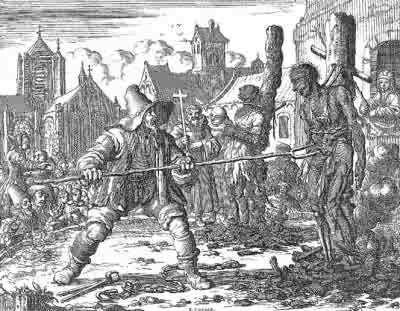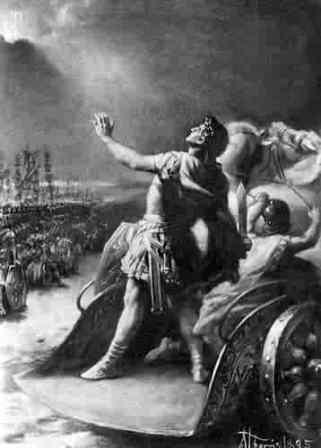|
restoring our biblical and constitutional foundations
|
What I Have Learned from the Anabaptists (Part 4)
I had just arrived in Basel when I happened upon a sporting goods store that had a large display window facing the street. To my amazement I saw something I never dreamed I would see in landlocked Switzerland – a surfboard for sale with the word “Kailua” on it, a reference to the beach where I grew up in Hawaii. I was delightfully surprised by this discovery. Warm, happy memories of my home town and its magnificent beach came to me. I had discovered in that shop window the sense of belonging that I had lost in that far-away city on the Rhine.
This simple incident
contained an important lesson for me: the power of symbols, identity,
belonging, security. That is what culture is all about. I mention this
because it seems to me that the Anabaptists of the sixteenth century were
willing to do what few of their religious counterparts today are willing
to do: abandon “security” and live as true pilgrims and strangers on earth. The Anabaptists did just that, and they did it in the face of
terrible persecution from their contemporaries, Catholics and Protestants alike, who
contemptuously
labeled them “Re-Baptizers.” In sixteenth century Europe a person could
not be called a dirtier name.
 The
Dissenters were considered the arch-enemies of Europe’s entrenched
religious and political institutions. They were regarded as more than
ill-informed
and antisocial. In a world of religious wars and economic rape, they were
deemed to be demonically-inspired heretics. When the nation-states
demanded them to bless their ambitions and sanctify their warring, the
Anabaptists simply refused. But anarchists they were not. Their view of a
just and limited state was self-consciously Bible-based, and by
withdrawing from the “culture” of their day they struck a radical blow for
liberty and conscience, a blow still felt to this day.
The
Dissenters were considered the arch-enemies of Europe’s entrenched
religious and political institutions. They were regarded as more than
ill-informed
and antisocial. In a world of religious wars and economic rape, they were
deemed to be demonically-inspired heretics. When the nation-states
demanded them to bless their ambitions and sanctify their warring, the
Anabaptists simply refused. But anarchists they were not. Their view of a
just and limited state was self-consciously Bible-based, and by
withdrawing from the “culture” of their day they struck a radical blow for
liberty and conscience, a blow still felt to this day.
Today the nation-state has become the most murderous and destructive force the world has ever known. Not just the horrific actions of totalitarian governments but the unlawful actions of legitimate governments cry out for redress. The church has become so domesticated, so “acculturated,” that it willingly tolerates the straightjacket of authoritarian theologies. It has forgotten the words of Jesus that His kingdom is not of this world, that His followers do not have to fight to advance His cause, and that His kingly authority comes from elsewhere. The Anabaptists faced an important question that still faces churches today: how to follow Jesus and do that responsibly in the political sphere. It was in direct consequence of their understanding of Christian discipleship that they became apolitical. Their refusal to take part in the magistery or to take an oath or to participate in violence was founded on their conception of two opposing kingdoms, one characterized by peace, the other by strife. While submitting to the authorities for conscience’ sake, they refused to allow the state any right to make decisions in the church, rejected the absolutist claims of the state, and refused to participate in religious warfare. Their pacifism had a profound theological orientation, and it was precisely for this reason they were persecuted so ruthlessly by the established churches.
Their views represent a theology of the state we can neither hear nor accept today. The Beatitudes have become absurd and unacceptable. We sterilize the words of Christ or reserve them for obscurantists. To declare that Christ’s kingdom is not of this world, that the state is both corruptible and corrupting, that the paternal power of government inevitably leads to servitude – such ideas are condemned as the nauseating notions of self-deceived revolutionaries. The persistence of this sacral mentality helps to explain certain American traits that foreigners find so baffling: the sacrosanct attitude toward statists such as Ann Coulter, Sean Hannity, and Rush Limbaugh; the biblical metaphors employed by American politicians to justify the spread of democracy at the point of a bayonet; and the rancor against critics of the state such as Ron Paul, Lew Rockwell, and Chuck Baldwin – to name just three.
In 1967 Michael Novak wrote, “It is very difficult for many American Christians even to conceive the possibility that American civilization is profoundly anti-Christian, precisely in those very places where it is most pious, patriotic, and full of noble sentiment” (“We Need a New Reformation…HERE!” [Together 11, Oct. 1967]). Novak is right. We attack the “issues” of the day and drag in Scriptures to support this stand or that. We become so preoccupied with politics that we forget to preach and live the Gospel. We talk “peace” when there is none. (The same goes for “security.”) Never has America sought so diligently to make itself safe as now and never with poorer results. We have resigned ourselves to unholy alliances with politicians with the excuse that “nobody is perfect.” False saviors offer their fads and panaceas and Christians join them with glee. Certainly American evangelicals have no right to point a condemning finger at the established churches of Europe.
And what of the
Anabaptists? They taught that the church is not only apolitical but
antipolitical in the sense that it regards political power as inevitably
idolatrous. The church is to seek the kingdom of heaven and its
righteousness. It therefore refuses to confer any value on political power
but instead
 radically
questions it. With Constantine’s victory at the Milvian Bridge,
however, the church became invested with political power, and it has sought
political power ever since. It acquiesced where Jesus resisted: the church
accepts all the kingdoms of the earth from Satan. It forges an alliance
with the state, which it now seeks to Christianize. Christianity becomes
the state religion, and the combination of truth and political power leads
to the abuses we know so well today: blind support of the state and its
policies; spreading the Gospel by force; refusing to challenge state
propaganda; failing to question the truth and validity of the alliance of
church and empire; redefining patriotism as nationalism; attaching the
label “Christian” to political parties; justifying revolution in the name
of “justice” (never defined); and using political power to secure to
itself advantages. All of this is an absurd contradiction to the life and
teaching of Jesus, who had nothing whatsoever to do with politics. To Him
such things were of no interest or importance. He neither entered
political debates nor encouraged them. He supported neither the followers
of Rome nor their enemies. And the earliest Christian community was of the
same mind.
radically
questions it. With Constantine’s victory at the Milvian Bridge,
however, the church became invested with political power, and it has sought
political power ever since. It acquiesced where Jesus resisted: the church
accepts all the kingdoms of the earth from Satan. It forges an alliance
with the state, which it now seeks to Christianize. Christianity becomes
the state religion, and the combination of truth and political power leads
to the abuses we know so well today: blind support of the state and its
policies; spreading the Gospel by force; refusing to challenge state
propaganda; failing to question the truth and validity of the alliance of
church and empire; redefining patriotism as nationalism; attaching the
label “Christian” to political parties; justifying revolution in the name
of “justice” (never defined); and using political power to secure to
itself advantages. All of this is an absurd contradiction to the life and
teaching of Jesus, who had nothing whatsoever to do with politics. To Him
such things were of no interest or importance. He neither entered
political debates nor encouraged them. He supported neither the followers
of Rome nor their enemies. And the earliest Christian community was of the
same mind.
And today? We have a church of the right and a church of the left, a church for Republicans and a church for Democrats, a church for gay marriage and a church against it, and on and on it goes. Adulteration by political power has many faces indeed. Christianity in America is now seen as an indispensable tool for political campaigning (the exact opposite of what it is scripturally), and its biblical language and metaphors are used to support our wars of conquest. Satan must be jumping with joy. He would have the church conform to the age. He would have us forget that we are pilgrims and strangers, alien citizens of heaven. He would have us compromise and cut a deal to get the kingdoms of the earth by a shortcut. But Jesus shows us that we do not have to bow to the devil to win the world.
Regardless of what one thinks of Anabaptism, all true Christians must be for peace. This does not mean that we must all be pacifists. But even if one believes that violence may become necessary in emergencies, we are all to be peacemakers. The Gospel is a Gospel of peace. God is the God of peace. As followers of Christ we must think about peace, talk about peace, pray for peace, and work for peace. Politics inevitably seeks to use religion for narrow political purposes. The church, however, should be an entity that transcends all earthly loyalties and that constantly calls the power of the state into question. This is what the Anabaptists of the sixteenth century believed and taught, and, I think, it is worth believing and teaching in the twenty-first.
Vaclav Havel once said that people living in Western democracies are just as manipulated as people living in totalitarian regimes, albeit in more subtle ways. Is this not true of politics? In the end, I believe the most effective contribution the church can make to politics is its faithful, even stubborn, adherence to a strict separationist stand, with primary concern to guard the wall that divides church and state.
Addendum: Comparison of the 1925, 1963, and 2000 Baptist Faith and Message:
|
|
|
Has anything been lost with the omission of the phrase “and to oppose everything likely to provoke war” that appears in the 1925 version? I want to make it clear that I believe all three versions are powerful and profound peace statements. I have no hesitation whatever in saying that each responds effectively to the nation-state’s war-making power. Nor should anyone say that these statements are unclear. That is false. Each is fundamentally true and strongly biblical, even Anabaptistic. I should only add that the omitted line is as strongly biblical as the rest of the statements. The important thing, it seems to me, is less the precise wording of these statements than their association with a fundamental Christian truth: followers of Jesus Christ (Baptist or otherwise) have an obligation to become active participants in the ministry of peacebuilding. Ultimately the real question is: How well are we carrying out that responsibility?
July 31, 2007
David Alan Black is the editor of www.daveblackonline.com.